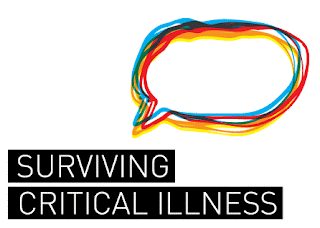There is now a little band of people muttering about Critical Illness Insurance (CII)
Why? Because they were critically ill and their insurers didn't pay out because they had the wrong type of illness.
Absolute bollocks I hear you cry! Couldn't agree more and I wrote a piece about it all in 2011- here's the link.
Anyway, things have begun to get interesting and we have started a Facebook group up in an attempt to find others who have fallen foul of this insurance 'scam'
If you know anyone this applies to, get them to join. We need as much support on this as we can get.
To this end and to STOP insurance companies making up their own definition of what actually constitutes "critical illness' we need NHS England and any other medical bodies and institutions to agree on a clinical definition.
In a recent meeting with Dr Ron Daniels, founder of Sepsis UK, we came up with the following:
Critical Illness is a non-specific, life-threatening illness which requires treatment in an Intensive or Critical Care Unit (ICU, ITU, CCU etc.). Critical Illness is defined by the severity of the illness not by the condition that causes it. Typically critically ill patients require advanced respiratory support and / or support for at least two organs. Critical Illness includes all complex patients requiring support for multi-organ failure.
This definition is in line with Level 3 care - Dept of Health 2000.
Time scale: this definition does not rely on a time scale. Diagnosis of Critical Illness and the provision of Critical Care may be applied at any stage of a patient’s illness and its duration is determined only by clinical guidelines.
Recovering from the mental and physical trauma of critical illness is tough. Survivors often feel confused, vulnerable and isolated; some are even diagnosed with PTSD as a direct result of their experience. This situation can be exacerbated by crippling financial shock. Many survivors are unable to work for an extended period and some find it impossible to return to a normal, full time career as before. It is to avoid these circumstances that critical illness cover is purchased.
Unfortunately CIC/CII is not what it claims to be and many critical illness survivors find they are not covered. Sepsis is the single biggest admission diagnosis to critical care in the UK and is second only (current research) to heart disease in cases. Sepsis (which from anecdotal evidence is a component of 70% of critical illnesses cases) along with UTI, pneumonia, asthma and nearly 400 other conditions we have found to date are not covered by this insurance. In other words CIC/CII covers less than 10% of the conditions that can make you critically ill.
There is no established clinical/medical definition of critical illness which allows commercial interests to define it for their own ends. We believe that a condition based definition is, at best inappropriate and misleading. There is no moral hazard with critical illness insurance, no one sets out to become critically ill and you can not chose what condition you get. This effectively means policy holders are paying for a very expensive lottery rather than the security and piece of mind as the insurance industry would have you believe. This makes it unfit for purpose and can be compared to PPI.



No comments:
Post a Comment